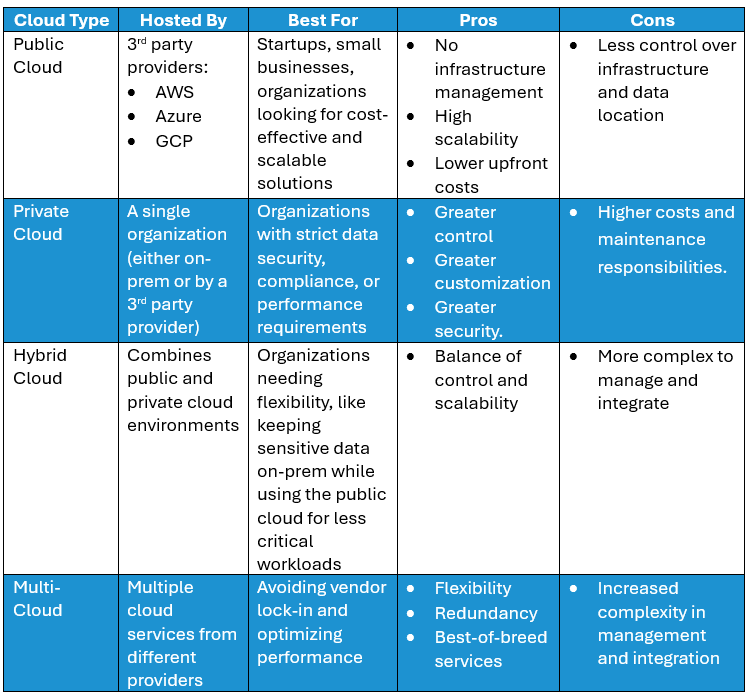
Cloud Solutions: A Guide for Modern Businesses
July 17, 2025
Businesses today are understandably searching for ways to be more agile, scalable, and cost-effective. One of the most effective tools allowing business owners to do this is cloud computing. Many people struggle to understand what cloud computing is because there are a lot of moving parts and varieties. This blog will discuss what cloud solutions are, and how you can determine which type is right for your organization’s needs.
What Are Cloud Solutions?
First, it’s important to understand what exactly cloud solutions are. Cloud solutions refer to services such as storage, computing power, databases, networking, and software. These are all delivered over the internet (or what we more commonly know as “the cloud”) rather than through local servers or personal devices.
The Cloud is a broad term that most people have likely heard, but we aren’t really given much context as to what it actually is. In a nutshell, instead of owning and maintaining physical infrastructure, businesses can access these resources on-demand from cloud providers like Amazon Web Services (AWS), Microsoft Azure, or Google Cloud Platform (GCP).
Why Businesses Use Cloud Solutions
Businesses use cloud solutions for better flexibility, scalability, and cost-efficiency in day-to-day operations. With cloud-based infrastructure, organizations can access computing resources, storage, and software applications over the internet without needing significant upfront investments in physical hardware (this is a significant benefit). With this, you are able to scale resources up or down based on demand, which is important for businesses with fluctuating workloads or seasonal spikes.
Cloud services often operate on a pay-as-you-go model, allowing organizations to better manage IT budgets and reduce waste.
Organizations may also use cloud solutions to improve collaboration and accessibility among employees. They allow workers to access files, applications, and systems from pretty much anywhere with an internet connection. With the shift to remote work and global hiring practices, this is crucial.
Cloud solutions have built-in tools that allow for better collaboration, data sharing, and communication. Cloud providers also typically have high-level and advanced security measures, automatic updates, and disaster recovery options, which help protect sensitive or important data.
Types of Cloud Computing
Cloud computing comes in several models each suited to different needs. Please see and review the chart below to understand what the four types are, hosts, who would benefit most from their use, and the pros and cons of each:

Choosing the Right Cloud Model
Now that we’ve laid out the various types of cloud models and who would benefit from what type, you have to determine how to choose the right solution. Choosing the right cloud solution depends on a variety of factors like your organization’s goals, resources, and regulatory requirements. Below are some questions you can ask yourself that will hopefully help you come to the right decision:
- What’s my budget? Public cloud is often more cost-effective for smaller teams if you’re working with a smaller budget.
- Do I (or people in my organization) handle sensitive data? A private or hybrid cloud may be necessary for compliance.
- How much control do I need? Private clouds offer more customization.
- Do I need to scale quickly? Public and hybrid models are best for rapid growth.
- Am I already using multiple vendors? A multi-cloud strategy might make more sense in this case.
Conclusion
Cloud solutions are unfortunately not one-size-fits-all; fortunately, we wrote this blog exactly for this reason. The right approach depends on your unique business needs, technical capabilities, and long-term goals. Understanding your options is the first step toward a more agile future.
If you’re still stuck, no problem! We’re here to help. Get in touch by filling out the form at the bottom of this page.
Thanks for reading! Make sure to subscribe to our blog. We publish technology tips, tricks, and updates every week.
Want to hear the latest from out team of experts? Sign up to receive the latest news right to your inbox. You may unsubscribe at anytime.

Discover More
Integration Between Power Platform and SharePoint Encourages Innovation
Organizations are focusing on innovation, streamlining their processes, and delivering better experiences for employees and customers. Power Platform and SharePoint are the Microsoft products that are helping organizations focus on…
Mastering Subagents in VS Code + Copilot: How To Actually Use Them
If you’ve ever dumped a giant problem into Copilot Chat and watched the conversation slowly turn into spaghetti, subagents are the feature you’ve been waiting for. Think of subagents as…
5 Common Misconceptions About Cloud Migration: Debunking the Myths
We’ve all heard of the cloud and cloud migration. But how important is it actually for your business? Organizations are moving to the cloud for several reasons: to improve agility,…

Let’s build something amazing together
From concept to handoff, we’d love to learn more about what you are working on.
Send us a message below or call us at 1-800-989-6022.





